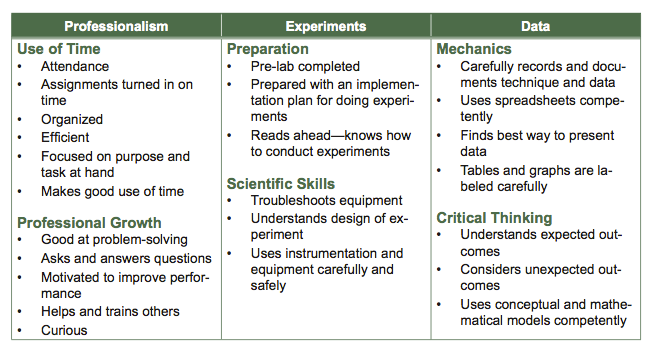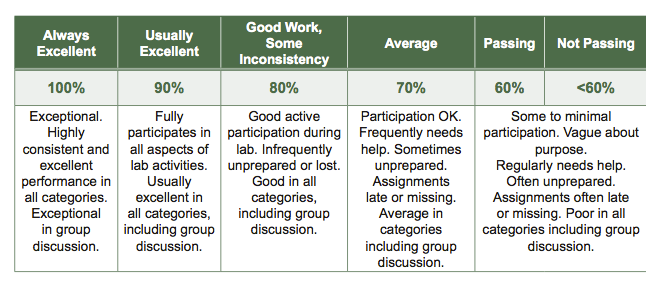Chapter 1. APPENDIX A Group Learning and Performance in Lab
Introduction
Group Learning in Biology Lab
Modern biologists rarely work alone. Biology lab is designed to help you develop collaborative skills that you will use as a scientist or health professional.

Rotating Team Roles: All labs require cooperative teamwork with each team member assuming one of four roles in lab activities. Each team member has primary responsibilities in a particular team role, and each week these roles rotate among the members of the team.
Team Leader: Assigns tasks to other team members in accordance with the lab procedure or lab outline. The team leader manages time by dividing the workload between group members and creates a plan to complete the lab within the time constraints, using the resources available.
Analyst: Observes the contributions of each team member and evaluates the performance of the team as a working group. The analyst is responsible for providing feedback to the team on their activities as biologists—the team members use this information to improve their laboratory and learning skill performance. The analyst records the Strengths, Areas for Improvement, and Insights (SII) for the team.
- S–Strengths—What is the greatest strength of your team? What is the team doing particularly well? What progress has your team made since the last time you worked together?
- I–Areas for Improvement—In what areas does your team need to improve? What has your team been lacking, forgetting, or ignoring? What areas could your team improve in order to function better?
- I–Insights—What insights emerged from your lab work? What interesting or important things has the team learned? What has your team discovered about collaboration that has improved the quality of your work and effort?
Technician: Leads their team in the use of lab equipment and the performance of required lab procedures using the SALI created by the team for each piece of equipment. The technician is responsible for reporting observations to the team throughout lab activities. The technician operates in real time, describing what is taking place and teaching other team members to use laboratory tools. The technician responds to requests within the team for information from the lab resources (all team members are expected to be prepared in a general way for all lab experiences).
Recorder: Records the critical lab data and observations made by the team. Also serves as spokesperson for the team answering questions and representing the team during discussions.
As you rotate through each of these roles, concentrate on developing skills that will prepare you for a professional career in the biological or health sciences. Your proficiency in these skills listed below will guide your instructors’ assessments of your performance in lab.
BIO 204/5 Lab Assessment for Performance Score

Evaluation
You will be rated on a scale of 0–100% for your performance score for each lab.
